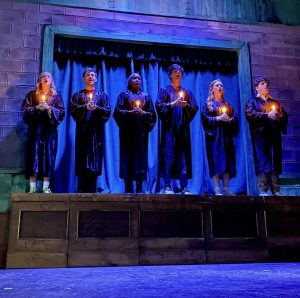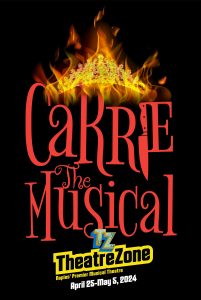Sage observations about Margaret White from McLean Peterson
 McLean Peterson is chilling in the role of Margaret White in TheatreZone’s production of Carrie the Musical.
McLean Peterson is chilling in the role of Margaret White in TheatreZone’s production of Carrie the Musical.
Carrie is an incredibly well-directed, brilliantly acted and imaginatively staged and choreographed musical. It is also a psychological study of deviant personalities – like that of Carrie’s mother, Margaret White, a seriously damaged soul.
Peterson’s portrayal is terribly convincing, a testament to her willingness to embrace her character’s blatant hypocrisy and ability to understand – both cognitively and intuitively – her character’s many contradictions.
“Margaret is a  survivor of sexual assault, rape and violence and a product of the deep repression and suppression of those feelings that come along with being hurt in that way,” Peterson observes. “She is an example of what happens when you suppress what happens to you.”
survivor of sexual assault, rape and violence and a product of the deep repression and suppression of those feelings that come along with being hurt in that way,” Peterson observes. “She is an example of what happens when you suppress what happens to you.”
Rather than seek or accept counseling, Margaret White turns to religion as her panacea.
“In order to survive that trauma, Margaret really leans into and grips onto her religion, into Christianity … really leans into that and reads the Bible religiously, literally, just like constantly,” Peterson amplifies.
“She undoubtedly has much of it memorized. I think she relies on the black-and-white nature  of that text and finds comfort in those extremities. It’s hard to see how King is not writing a lesson about the dangers of being a Christian zealot.”
of that text and finds comfort in those extremities. It’s hard to see how King is not writing a lesson about the dangers of being a Christian zealot.”
Not surprisingly, Margaret imposes her strict and unrelenting religiosity on her daughter. To the extent that Carrie remains simple, pure and angelic, she justifies the violence Margaret suffered during her sexual assault and Carrie’s childbirth. Toward that end, she isolates Carrie from interactions with her peers and compels her to spend  endless hours in prayer and Bible study.
endless hours in prayer and Bible study.
“She’s not able to connect with her daughter in a healthy way,” says Peterson, not one given in any way to hyperbole.
“She’s only able to connect to Carrie as an object, as kind of an idol. Margaret sees Carrie as this perfect angel without flaw. She has this Virgin Mary kind of ideation going on.”
 All that changes when Carrie comes home one afternoon in hysterics. She had her first menstrual cycle in the shower after high school gym class. Since Margaret had convinced herself that Carrie was “special” in the same way as the Virgin Mary, she never told her daughter that she would one day have a period – leaving her daughter to believe she was dying, further subjecting her to ridicule by her classmates, both male and female.
All that changes when Carrie comes home one afternoon in hysterics. She had her first menstrual cycle in the shower after high school gym class. Since Margaret had convinced herself that Carrie was “special” in the same way as the Virgin Mary, she never told her daughter that she would one day have a period – leaving her daughter to believe she was dying, further subjecting her to ridicule by her classmates, both male and female.
“As soon as Carrie shares that she’s having her period and developing and growing beyond that childlike perfection Margaret sees her as, it’s devastating news because Margaret honestly  believes that Carrie would always stay her perfect child and never grow to be an adult with her own opinions and thoughts and mistakes,” Peterson elaborates.
believes that Carrie would always stay her perfect child and never grow to be an adult with her own opinions and thoughts and mistakes,” Peterson elaborates.
These unrealistic expectations, and the deep disappointment and fear they engender occur in juxtaposition to the abiding love that Margaret feels for her daughter – or at least the idealized person she imagines her to be.
And this dichotomy is aptly encapsulated in a haunting duet that Peterson sings with Keeley Pendergrass, who plays the part of Carrie White. Titled “Evening Prayers,” it’s one of several showstoppers.
And  a theme that repeats throughout the balance of the musical.
a theme that repeats throughout the balance of the musical.
But Carrie isn’t the pure porcelain doll her mother needs her to be. Although she’s browbeaten and mercilessly bullied, she has hopes, dreams and a desperate need for acceptance. Her growing recognition and acceptance the emotions she has long assayed to suppress are symbolized in this story by Carrie’s emerging powers of telekinesis.
 And it’s that power – the power to move objects with her mind alone – that Margaret finds abhorrent to everything in which she believes.
And it’s that power – the power to move objects with her mind alone – that Margaret finds abhorrent to everything in which she believes.
“Margaret sees it, of course, as witchcraft,” Peterson points out.
“That’s how it plays out, dramatically, because it’s in opposition to her Christianity. And in Margaret’s world, witch and angel are put in opposition. Margaret absolutely, immediately sees telekinesis as a danger and, certainly, a sign of evil. People with evil powers will do evil things.”
And so Margaret resolves to sacrifice her daughter in the same way Abraham was called upon to sacrifice Isaac. But God called  upon Abraham to sacrifice his son as a test. Margaret White, by contrast, isn’t being tested. She is also not motivated to rid the world of the menace she deems her daughter to be.
upon Abraham to sacrifice his son as a test. Margaret White, by contrast, isn’t being tested. She is also not motivated to rid the world of the menace she deems her daughter to be.
Rather, if she cannot control Carrie, then Margaret must end her life. Pure and simple. Nothing more.
“To Margaret, it’s too much to allow Carrie to become her own person, make her own decisions, being in charge of her own life. That reversal of power is far too terrifying for Margaret to engage with.”
While horror stories postulate the presence of a monster, Carrie is not the monster in this musical. The bullies at her school are monsters. The other kids who go along with the bullying are monsters too. And Margaret White is a monster – at least to the extent that she is a stand-in for religious fanaticism in the world created by Stephen King in this story. But Peterson’s performance is not one-dimensional.
who go along with the bullying are monsters too. And Margaret White is a monster – at least to the extent that she is a stand-in for religious fanaticism in the world created by Stephen King in this story. But Peterson’s performance is not one-dimensional.
In her hands, Margaret White is just as damaged and worthy of sympathy than her daughter. She is a woman who has fallen through the cracks – an example of the damage that the victim of abuse and sexual violence can, in turn, inflict on a child and an entire community when he or she does not receive the support they need and deserve in the aftermath of trauma.
McLean Peterson’s  performance in this role is well worth applauding for these reasons alone. But that would ignore the commanding presence she brings to every scene and her powerful vocals in each musical number.
performance in this role is well worth applauding for these reasons alone. But that would ignore the commanding presence she brings to every scene and her powerful vocals in each musical number.
McLean Peterson is an actor and filmmaker based in Brooklyn, New York.
Among her theater credits are the national tour of Ivy & Bean. Off Broadway, she has been the U/S for Tess in The Jury (A.R.T./New York), Karen in Pop Punk High (Le Poisson Rouge), Queen Margarethe in Pirate La Dee Da (Atlantic Theater Co.) and Nurse in The Velveteen Rabbit  (Atlantic Theater Co.). McLean’s regional credits include The Balladeer in Assassins at The Secret Theater, and her New York stage credits include Blanche in Blanche & Stella, Ivanka in IvankaPlay (Edinburgh Fringe), Mayor Ed Kelly in Convention (Irondale) and Allie in CRACKS (Fringe NYC), each of which represented the play’s world premiere.
(Atlantic Theater Co.). McLean’s regional credits include The Balladeer in Assassins at The Secret Theater, and her New York stage credits include Blanche in Blanche & Stella, Ivanka in IvankaPlay (Edinburgh Fringe), Mayor Ed Kelly in Convention (Irondale) and Allie in CRACKS (Fringe NYC), each of which represented the play’s world premiere.
Peterson’s film and TV credits include Walker in The Chaperone (PBS), Maggie (Lead) in Friend Crush (Film Olympiad Grand Prix Winner, Silver Award for Leading Actress), Alana Wheeler (Lead) in Summoners (Silver Audience Award), Vicky (Lead) in Birdie (Best Short Psychological Thriller) and Girlfriend (Co-Star) in Jessica Jones (Netflix).
(Netflix).
McLean recently directed, produced and starred in the short film Tape, which premiered at the New York City Horror Film Festival in 2023.
To follow McLean, please visit www.mcleanpeterson.com.
April 29, 2024.














 Tom Hall is both an amateur artist and aspiring novelist who writes art quest thrillers. He is in the final stages of completing his debut novel titled "Art Detective," a story that fictionalizes the discovery of the fabled billion-dollar Impressionist collection of Parisian art dealer Josse Bernheim-Jeune, thought by many to have perished during World War II when the collection's hiding place, Castle de Rastignac in southern France, was destroyed by the Wehrmacht in reprisal for attacks made by members of the Resistance operating in the area. A former tax attorney, Tom holds a bachelor's degree as well as both a juris doctorate and masters of laws in taxation from the University of Florida. Tom lives in Estero, Florida with his fiancee, Connie, and their four cats.
Tom Hall is both an amateur artist and aspiring novelist who writes art quest thrillers. He is in the final stages of completing his debut novel titled "Art Detective," a story that fictionalizes the discovery of the fabled billion-dollar Impressionist collection of Parisian art dealer Josse Bernheim-Jeune, thought by many to have perished during World War II when the collection's hiding place, Castle de Rastignac in southern France, was destroyed by the Wehrmacht in reprisal for attacks made by members of the Resistance operating in the area. A former tax attorney, Tom holds a bachelor's degree as well as both a juris doctorate and masters of laws in taxation from the University of Florida. Tom lives in Estero, Florida with his fiancee, Connie, and their four cats.